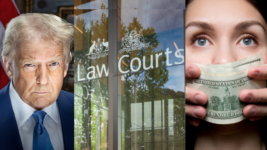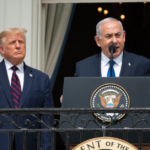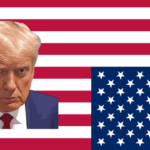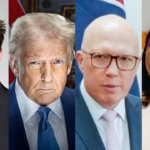Trump’s Attack on Lawyers Signals Where Authoritarianism Can Take Us

The Trump administration is continuing its revamping of the United States, as a modern authoritarian regime, that now flagrantly disregards the norms of international law, whilst terrorising its domestic population with increasing assaults upon civil rights and the social sector, so it should come as no surprise that the US president has now turned his attacks upon the legal fraternity.
Donald Trump launched his war against lawyers, or attorneys as they’re known in the US, in March.
One of the first signs it was being advanced came with the signing of a 14 March 2025 executive order targeting Paul Wiess, one of the largest US legal outfits, which accused it of long having undermined the judicial process and attempting to destroy bedrock American principles, and much to the aghast of many in the US legal community, it capitulated to the administration’s demands.
Trump then issued a 22 March 2025 presidential memorandum to the US attorney general, explaining that US lawyers aren’t following basic “rules governing attorney conduct”, which is especially so when litigating against government or “in pursuing baseless partisan attacks”, so he was empowering the AG to sanction these lawyers and US Homeland Security to enforce rules and discipline.
Since then, the Trump administration has continued to issue executive orders targeting specific law firms, which list grievances against them and dictate the retribution that will be taken if they fail to right their ways, which for the most part means act in agreeance with the government. And while a number of firms have resisted orders, more disturbingly about the same amount have agreed.
And as Australian lawyers witness the real-time dissolution of the rule of law in the US and how it’s directly undermining their profession and equality before the law over there, it should be noted that while these orders have no effect on local firms, our nation’s close alliance with the US and its connections with its legal system are bound to lead to a chilling effect in this country as well.
To succumb or resist
The Paul Wiess capitulation to Trump’s demands in order to avoid the effects that the sanctions would have had on its business, has upset much of the US legal fraternity, as it makes it more difficult for others to resist Trump’s incursions.
The Wiess executive order sets out Trump’s key gripes, which include the firm having attempted litigation against him, its use of certain lawyers and its provision of pro bono services to assist people or causes.
Indeed, part of the White House terms that saw it rescind the Paul Weiss executive order involved the firm agreeing to donate $40 million worth of pro bono legal services to the Trump administration.
The executive order contains some of the signature threats the administration is making on lawyers as well, including the removal of security clearances into buildings containing courts, the preventing of federal government contractors working with the firm, requiring the ending of diversity, equity, and inclusion (DEI) provisions and the banning of a firm’s staff from federal government buildings.
Other law firms have stood their ground, however. Executive orders issued against Perkins Coie LLP, Jenner & Block and Wilmerhale have all been challenged in court, which has resulted in the temporary blocking of orders, while the Trump administration has then failed to make any plausible legal claim to prevent the block, which means a number of orders are now stuck in a legal limbo.
But despite how easily the orders do fall over in court, many large law firms are succumbing to White House demands. These include Willkie Farr & Gallagher, Skadden and Milbank, which have not only agreed to end certain litigation and replace DEI with “merits-based employment”, but each firm has also pledged to donate $100 million worth of pro bono services to the new administration.
Inequality before the law
Over 800 of the leading US legal firms opposed to Trump’s executive order regime concerning attorneys have signed an amicus brief, which is being submitted as evidence to the courts presiding over the cases that have involved US law firms the subject of an executive order challenging the unconstitutional and illegal nature of them.
The brief outlines that the orders being issued “take direct aim” at “leading law firms and seek to cow every other firm, large and small, into submission”, and the government is also employing “vague and unsubstantiated allegations” that target entire firms, along with their clients and personnel via the deterrence of “draconian punishment”, which ultimately, threatens their survival.
“Our adversarial system depends upon zealous advocates litigating each side of a case with equal vigour, that is how impartial judges arrive at just, informed decisions that vindicate the rule of law,” the document sets out.
“In the same vein, it is a deeply held principle of the legal profession that everyone, no matter their actions or beliefs, is entitled to zealous advocacy on their behalf.”
The law firms further underscore that attorneys play a vital role in challenging the actions of the president and government, as they provide a check against “overreach, whether it be infringements on religious liberty, assaults on the freedom of the press or burdensome regulation”.
The brief is also critical of the Trump administration’s attacks on the provision of pro bono legal services, which tends to suggest that lawyers might be right to “fear retribution” if they do provide services free-of-charge to poor sectors of the community being penalised by government or to assist in legal challenges on government frowned upon matters such as climate change or immigration.
The law firms end their brief by underscoring that all lawyers take an oath to uphold the US Constitution and to discharge the obligations of the legal profession, and it obligates them all, no matter what their political views, to ensure the rule of law is upheld in the United States, and that is why they find it necessary to take a stand now in the face of this unprecedented threat.
Chills in the antipodes?
Of course, Australian law firms can rest assured that US president Trump will not be issuing any executive orders that directly impact their companies. Indeed, any legislative amendments to the laws governing the US criminal justice system will fail to have any direct impact upon the laws governing legal practices and professionals down under.
Trump’s measures against firms could, however, have a chilling effect over here, especially given that the US is our closest ally, and the returned Albanese government has opened the floodgates over the last three years, in terms of greater US control over local military and territory, whilst PM Anthony Albanese even allowed Washington to designate us as a domestic source for military purposes in law.
But another more direct means that might see our legal landscape shift in a similar manner to that of its US counterpart has been witnessed at play in other local sectors. Indeed, when Trump unleashed his agenda on US universities, his administration also severed funding ties with six Australian unis, because of their “woke agendas” that included DEI and recognition of more than two sexes.
Some Australian law firms have strong links with US legal firms. Some local firms are transnational and have a dual presence in the US. In fact, some Australian firms have US clients and even US government clients.
So, if these Australian legal firms don’t start to shift in alliance with the Trump agenda, then their future existence might be in jeopardy, and just like in politics, the appearance of more extreme elements in the local legal arena will shift the centre of the field, so that ways of operating and litigating that might have once been considered fringe will suddenly become the new moderate.







